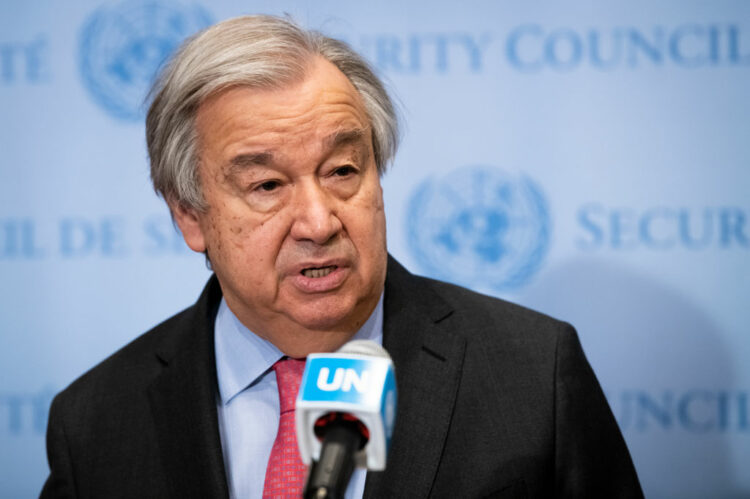UN Secretary General Antonio Guterres has emphasised UN support to Africa countries in his fight to end the scourge of terrorism, noting that the situation in the region is worrisome.
Guterres said this at a debate on Tuesday at UN headquarters in New York, organised by the Security Council, headed by Mozambique, which holds the rotating Security Council presidency in the month of March.
Leaders from across the continent joined ambassadors in examining how to counter terrorism and better prevent violent extremism through stronger cooperation between the UN and regional organisations.
The debate was chaired by President Filipe Nyusi of Mozambique, is one of the countries that has been battling a deadly insurgency in the north for more than five years.
The secretary-general expressed deep concern over the gains which terrorist groups were making in the Sahel and other parts of Africa.
“Despair, poverty, hunger, lack of basic services, unemployment, and unconstitutional changes in government continue to lay fertile ground for the creeping expansion of terrorist groups to infect new parts of the continent,” he said.
According to him, fighters, funds and weapons are increasingly flowing between regions and across the continent while terrorist groups are forging new alliances with organised crime networks and piracy groups.
He added that their “violent ideologies” are also being spread online.
Guterres said that just as terrorism drives people apart, countering can bring countries together, pointing to several initiatives across Africa, including in the Sahel, the Lake Chad Basin and Mozambique.
“The United Nations stands with Africa to end this scourge,” he added.
“Above all, it includes our ongoing close collaboration with the African Union (AU) and regional and sub-regional African organisations.”
Guterres said the UN had been delivering tailored assistance to African countries in areas that include prevention, legal assistance, investigations, prosecutions, reintegration and rehabilitation.
Alongside Nigeria, he said the UN would also co-organising the upcoming African Counter Terrorism Summit and would strengthening work together on important peace initiatives.
In addition, he said the organisation would also advocates for new AU-led “robust” peace-enforcement missions and counter-terrorism operations, with Security Council mandates, urging countries to support this vital work.
The secretary-general also looked to June, when the UN Global Counter- Terrorism Strategy, adopted in 2006, undergoes its eighth review.
This, he said would mark a “critical opportunity” for countries to find new ways to more effectively tackle the conditions that create the fertile ground for terrorism to spread.
The meeting will also serve as a reminder that human rights must be at the centre of counter-terrorism efforts, he added.
“Evidence shows that counter-terrorism efforts that are solely security-focused rather than human-rights based, can inadvertently increase marginalization and exclusion, and make the situation even worse,” he said.
Also speaking, the new AU Chairperson, President Azali Assoumani of Comoros, noted that although terrorism has been around for ages “since the Libyan crisis in 2011 it has really exploded, and particularly in Africa.”
As a result, thousands of foreign fighters and combatants flooded into the Sahel, which helped with importing terrorist groups onto the continent, along with “an uncontrollable circulation of weapons”.
“In this way, progressively, terrorism took on greater and greater scope in Africa – from north to south, from east to west. And the terrorist contagion continues, broadening in almost all regions of Africa,” he said, speaking through an interpreter.
Like climate change, terrorism is among the most serious threats to the international community, said President Nyusi of Mozambique, delivering his first-ever remarks to the UN Security Council.
“The expansion of terrorism is quite threatening, and it is driven by factors that vary from context to context.
On one hand, radicalisation based on identity variables fuelled by intolerance and, on the other hand, the manipulation of socio-economic factors have accelerated recruitment to terrorist groups, particularly of the youth,” he said, speaking through an interpreter.
Citing the 2022 Global Terrorism Index, he reported that some 48 per cent of terrorism-related deaths occurred in Africa, while the Sahel is the “new epicentre” of terrorist attacks.
President Nyusi said African countries, the AU and regional organisations on the continent – such as the Southern African Development Community (SADC), the West African bloc ECOWAS, and its East African counterpart, IGAD – had accumulated years of experience in conflict resolution.
A SADC Mission in Mozambique (SAMIM) has been fighting terrorists in the northern province of Cabo Delgado for nearly two years – an example of “African solutions to African problems” and an approach that could be replicated elsewhere.
“For Mozambique, this experience is vested with an added value, as, presently we are fighting terrorism combining SADC regional multilateral efforts with bilateral efforts between Mozambique and Rwanda, and together we are successfully fighting terrorism,” he said.
Nyusi also offered proposals for the upcoming review of the UN Global Counter-Terrorism Strategy, urging countries to establish a fund that would strengthen local community resilience, including through job creation projects for young people, particularly in Africa and the Middle East.









